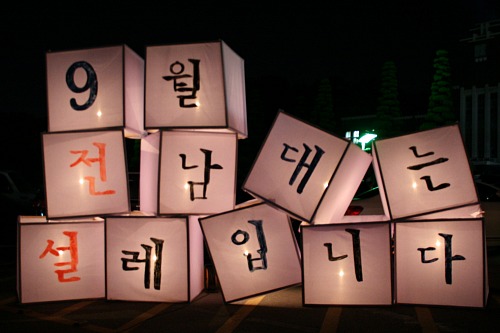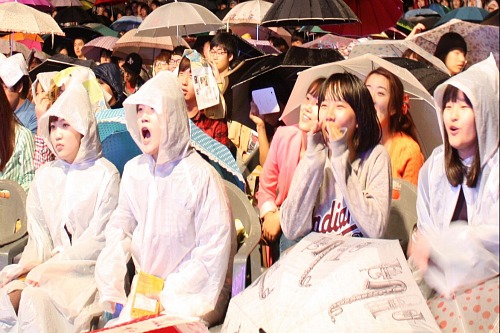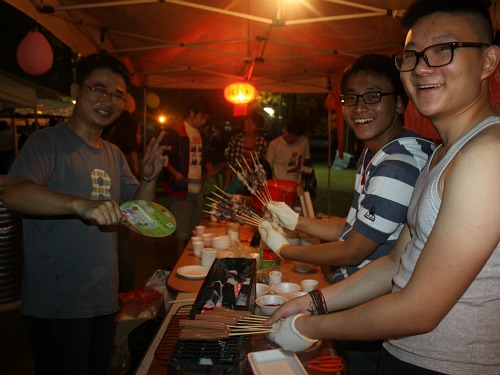<#312 Special Report_Main>
CNU Festival Needs to Have Quality for All the Members
By Kang Min-hee, Student Editor
Rigoberto Banta Jr., Tribune Reporter
Delicious smells, colorful flags and cool music. The General Students Council (GCS) of CNU has been preparing for one of its biggest events in the academic year, CNU’s annual school festival, “Yongbong Daedaongpuri”, from September 28th to 30th. For three days, CNUians and local residents could enjoy interesting programs including pop concerts featuring famous singers and sporting events on campus. Did you enjoy the festival program? In this issue, Chonnam Tribune identified CNU students’ attitudes and response to the 2011 CNU Festival and concluded that it had special characteristics for both local and foreign students.

Festival for Participation and Communication
The theme of this year’s school festival, adopted by the General Student Council (GSC), is ‘Participation and Communication’. In order to increase students’ active participation in the festival, the GSC members prepared various programs such as pop concerts, sporting events, free markets, media contests, a multicultural lounge, campus club promotions and a Jumak (Korean pub) on campus. Inter-college and inter-department communication was increased by the programs set by the GCS. The system of gathering volunteers for the annual school festival was improved and ensured student participation in the festival events and programs. As an inter-department program “Garden Fiesta” was held over the campus by the Division of Forest Resources and Landscape Architecture. Lee You-jin (a junior at the School of Mechanical System Engineering) said, “I did not know Division of Forest Resources and Landscape Architecture but I could learn about what they do through the program. The GSC also built a sub-stage on the Main Ground for visitors of the Jumak tents to sell food and beverages, and made a special road, Neonadeuli-ro around the ground. Lee Mi-hwa, Festival Committee Chairman, said, “While walking along Neonadeuli-ro, like the Ollegil, we might actively communicate with other students and local community residents.”
Did You Enjoy and Participate in the Festival?
The GSC finished all the preparation for the festival, which has now passed. How about the students? Hwang Yu-kyung (a junior at the School of Applied Chemical Engineering) said, “At first, I worried about enjoying the Annual Festival because I am senior. However, I participated in Pungmulpae, because I felt happy about participating”. Also, some students enjoyed their festival time as audience. Kim Ji-hun (a sophomore at the School of Business Administration) said, “I played some games such as throwing water balloons. I also watched some performances including not only singers’ but also club performances. It was very excited.”
However, many students did not participate in any programs or took part ivery timidly for many reasons. Han Mi-hee (a junior at the Department of Chinese Language and Literature) said, “One of my professors cancelled a class for students to take part in the festival, but I did not participate in any programs. It did not look interesting and I could not feel any need to participate.” For some students, the school festival is only about the artists invited to perform. Kim Byung-chan (Senior, Dept. of Computer Engineering) said, “Students come to the festival for two reasons: the artists and the drinks. I am very much satisfied with this year’s festival because the number of participant students increased and other student related events have improved as well.”
One of the biggest offsets of the festival this year is the tolerance of alcoholism on campus. While it is inevitable especially with the promotion of business for students associations, there should be more focus on encouraging other activities that contribute to the diversity of the festival itself.

Festival for both Local and Foreign Students
It is a time for merry-making, for enjoying the bliss of college life and a time to appreciate the fellowship of people who comprise the diverse mix of personalities inside the university. With the ever increasing number of foreign faces in the university—students and faculty alike—the annual school festival has revamped itself to provide an opportunity for cultural exchange as well in the globalized university of ours. Russian Yuliya Choi (Sophomore, School of Business Administration) said that the school festival is “a great time to hang out with friends.” She said that she had a plan to bring her foreign friends to the festival to enjoy their time efficiently and economically. However, in a short interview with Chonnam Tribune she expressed her detachment to the upcoming program. “I do not expect too much from the festival” she said, with an ostensible dissatisfaction towards the previous school festivals that she had attended.
Very disappointing, however, is the absence of plans for foreign students—“We still haven’t thought about the program for foreign students, but we plan on looking into it”, the Festival Committee Chairman stated in a positive perspective. The festival, in retrospect, has held a talent program for foreign students which included participation from local foreign communities in Gwangju, a program held last year as well. On the other hand, some foreign students are satisfied with the event, which however is very similar with the response mostly of Korean students. Thai Pekky Nira (Junior, Dept. of English Language and Literature) said, “This year is better than last year because there were famous singers, which in turn brought a lot of people to CNU!” The low expectations of foreign students at the school festival lead to the satisfaction that they receive throughout the event itself.
During the festival the Chinese Students Council, through cooperation with the Department of Chinese Language and Literature, opened a Jumak around the Main Ground. Bang Won, president of the Chinese Students Council, said, “It is the first time we have opened a Jumak. When our Chinese students came here, there wasn't anybody who could notice the festival. However, we have experienced festivals several times and decided to promote our organization by opening our own Jumak.” Chinese students which consist of 80% of the foreign student population at CNU could get opportunities to communicate with Korean students by running their Jumak.

For “Whole Together”
After the annual school festival had ended many students were generally satisfied with the results. The positive response of students showed that the General Student Council has achieved their goal: a good response to the biggest project before the upcoming elections for the next GSC. Truth be told, the annual school festival, is a satire itself—a very warm and bright smile that welcomes everyone with merry-making which hides the problems we are facing inside the university. Now, we need to look further into the real problems: a decrease in the number of students who participate in extracurricular activities and the marginalization of foreign students’ activity on campus. While trying to solve these problems, it is our responsibility to take a stand towards cooperation between different circles at CNU. Even though the significance of university festivals has changed, the festivals can promote students to develop a strong sense of community and to feel a sense of belonging to their university. The Chonnam Tribune hopes that CNU students can truly toast towards better “participation and communication” in the annual school festivals in the future.
강민희, Rigoberto Banta Jr 기자
tribune@cnumedia.com

